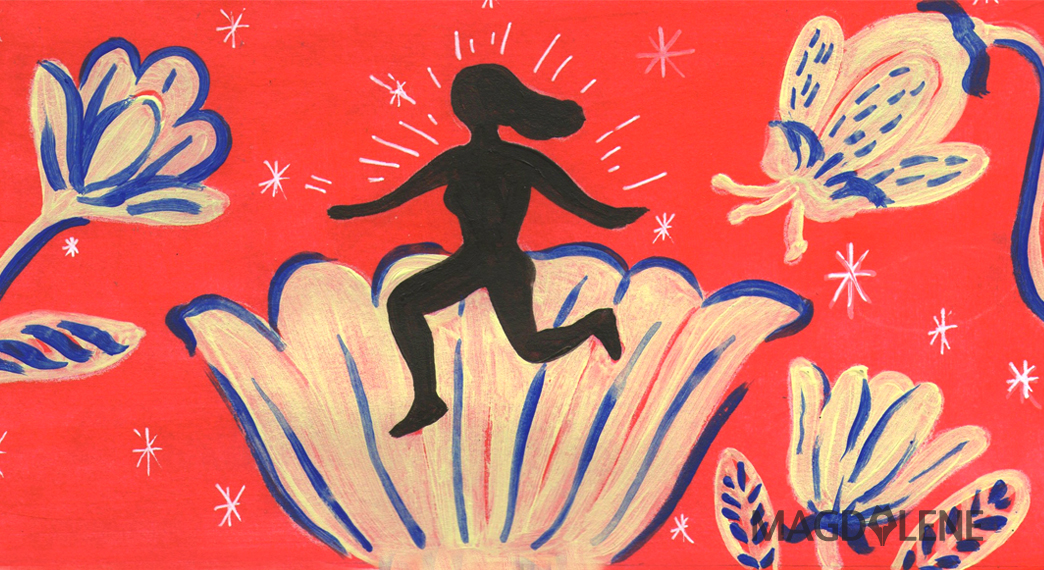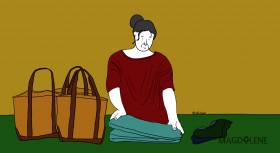
On the night before she set out to travel solo to more than a dozen countries, Famega Syavira Putri had a panic attack that almost made her change her mind.
“The idea of traveling solo from Indonesia to Africa certainly frightened me, but at the same time it excited me,” the 33 year old freelance journalist recalled her experience to Magdalene in a recent interview.
“The night before my departure, I had a panic attack. I almost canceled my tickets, but, thankfully, the call center couldn’t be reached. And so, I slept it all away. In the morning, surprisingly, I felt ready – calm and assured. I ordered a taxi and my journey began,” she said.
Famega captured her experience of traveling solo to 18 countries and 44 cities in four and a half months in her latest travel novel, Kelana. She was one of the writers featured during the Comma Books anniversary celebration last weekend (Dec. 8 and 9).
“Traveling solo allows me to be impulsive. I don’t need to follow or adjust to others’ needs and wants. I don’t have to stick to strict plans. My decision might inconvenience others when I travel with friends, but when I’m alone, I have so much freedom,” she said.
She attributed her decision to travel the world to curiosity.
“When I was a kid, I read books that took me to wander at faraway places. It got me curious about what’s more out there. My parents also took me to travel quite often back then. We once went on a 36 hours ship ride, and we enjoyed it so much.”
As a journalist she was reminded of how fond she used to be of travelling: “I felt like I had so much to look forward to, seeing real things with my own eyes and connecting with locals. That’s when I decided I wanted to travel.”
Her solo journey was made even more interesting by her decision to exchange air travel with
land and sea transportation, choosing trains, busses and ships over airplanes.
“I intentionally avoided planes because I wanted to experience everything fully. I wanted to see different sceneries, to observe every transitions of cultures and people. It is truly amazing to witness the changes.”
 The key was to be well prepared and well-planned, but also to be flexible to sudden changes or adjustments. Of all the countries, perhaps Russia was the strictest one, as it did not allow her to change her departure and arrival dates.
The key was to be well prepared and well-planned, but also to be flexible to sudden changes or adjustments. Of all the countries, perhaps Russia was the strictest one, as it did not allow her to change her departure and arrival dates.Her parents were not too crazy with her idea at first. They thought it was impossible, too expensive and too dangerous for her to travel alone.
“What sustained me was the belief that I could anticipate every condition. I did a lot of research about the countries I was about to visit. We should know the local culture before we go to the place,” she said.
“Clothing style, for one, we need to know what is appropriate and what is not for the locals. In Iran, your blouse should covers your bottoms. In India, your skirt should cover your legs. Each country has a different clothing culture, and I believe that as a tourist, we ought to respect that,” she added. For practicality and mobility, Famega packed all her clothes and necessities in a backpack.
Asked if she ever felt unsafe during her trips, Famega said things were more manageable if we came prepared and look confident.
“When you travel alone, you can never appear confused. You don’t want to appear vulnerable. Many people will offer you help, and they might seem kind and friendly, but you can’t trust just anybody. When in doubt, never accept help offers because we never know whether they have good or bad intention. Instead of risking it, just firmly say ‘no!’” she said.
She shared her other unsavory experience of being harrased: her breast being grabbed by a stranger, being stalked by a man in a car.
“In Iran, somebody walked so close to me for some time. It was creepy. But, I would not let these experiences diminish my enthusiasm. It only taught me to be more cautious and aware of my surroundings,” she said, adding she met more kind than bad people throughout her journey.
She used the hospitality and social network app CouchSurfing to stay at someone’s house for free, whether in a bed or on the couch. To ensure she would stay at trusted host, she would check visitors’ reviews on them.
 “There’s this one family that I was ‘couchsurfing’ with. In the morning when I woke up, the mother said to me, ‘I boiled you some water for bathing’. She didn’t speak English, so she asked her kid to translate for her when she wanted to talk to me. It was such a sweet moment,” said Famega.
“There’s this one family that I was ‘couchsurfing’ with. In the morning when I woke up, the mother said to me, ‘I boiled you some water for bathing’. She didn’t speak English, so she asked her kid to translate for her when she wanted to talk to me. It was such a sweet moment,” said Famega.Sometimes she stayed in motels, making sure the cost didn’t eat up into the budget of her self-financed trip.
Solo traveling forced her to talk and engage more with people, instead of relying too much on the safe bubble of friends or partners, she said. She also found that traveling can debunk stereotypes of people.
“Russian people are not as rough or scary as many people think they are, but they do like vodka. At a train ride, I met with this group of Russian guys. I was initially on my guard as they tried to talk to me, but they pressed on. One of them told me he just got off his military duty. Another told me about his job. They said they knew Bali, but nothing else about Indonesia. They asked whether Indonesian people like vodka,” she recalled the experience.
“All these conversations were done using sign language and drawings. It was fun; I felt like I was in a ‘picture guessing quiz’,” she said chuckling.
“Before we said good bye, they gave me a random duck toy, saying, ‘Whenever you look at this duck, remember our love for Indonesia,’” she said. “If I learn anything after the journey, it’s the fact that we are all more similar than we think we were. We’re all humans,” she said.
Of all the countries she visited, Mongolia left the most impression in her. She recalled the flat landscapes looking like a clean line and unlike any other places she had ever seen.
“But when it comes to culture, I have to say I love Spain. In Spain, I see people who enjoy life. They are so chill. They wake up, they have breakfast, they go to the market, they drink, they dance. Everything feels light and lively. I had planned to spend a week there, but I ended up staying for a month,” she laughed.
When asked what she would say to other young women who want to do travel writing, she highlighted some important points: “You don’t need to be afraid to travel as long as you research everything well. When you’re there, don’t waste your day writing: go interact with people, try new things, step out of your comfort zones. Keep simple notes and take pictures; write later. You also want to make sure that your writing is clear, well-structured, and is not drowned in too many details.”
It had not been her intention to write a book before she made the jouney, but once she arrived home, she pitched to Comma Books the idea to write a travel novel based on her experience. In two months, the book was finished.
She expressed hopes that her work can inspire more woman to travel and write.
“Traveling is known to be a ‘man’s thing’, but I disagree with this. Women should never give in to fears. If you want to go somewhere and do something, then start making it happen,” she said.
*Illustration by Karina Tungari
Find out about this publishing initiative for young emerging writers in Indonesia.









Comments